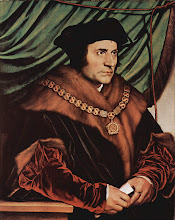This is from the concluding paragraph of the introductory chapter of his treatise Heretics:
"Suppose that a great commotion arises in the street about something, let us say a lamp-post, which many influential persons desire to pull down. A grey-clad monk, who is the spirit of the Middle Ages, is approached upon the matter, and begins to say, in the arid manner of the Schoolmen, 'Let us first of all consider, my brethren, the value of Light. If Light be in itself good -' At this point he is somewhat excusably knocked down. All the people make a rush for the lamp-post, the lamp-post is put down in ten minutes, and they go about congratulating each other on their unmediaeval practicality. But as things go on they do not work out so easily. Some people have pulled down the lamp-post down because they wanted the electric light; some because they wanted old iron; some because they wanted darkness, because their deeds were evil. Some thought it not enough of a lamp-post, some too much; some acted because they wanted to smash municipal machinery; some because they wanted to smash something. And there is war in the night, no man knowing whom he strikes. So, gradually and inevitably, to-day, to-morrow, or the next day, there comes back the conviction that the monk was right after all, and that all depends on what is the philosophy of Light. Only what we might have discussed under the gas-lamp, we now must discuss in the dark."
Seems to me like a fairly accurate portrayal of the dysfunctional feeding-frenzy that is the modern-day philosophical, political, social, and "spiritual but not religious" landscape. Only nowadays the grey-clad monk gets knocked down before he has a chance to speak (usually by those who know what he is going to say and have a vested interest in not letting others hear it) on the grounds that his unexpressed viewpoint must necessarily constitute "hate speech"; and, because his viewpoint is never submitted for consideration, it never occurs to those unfamiliar with his viewpoint to consider that in the end it really is about the philosophy of Light. It ends with those who hate the Light convincing everyone else that the dark really is a better setting for their discussions. Unless, of course, the grey-clad monk picks himself up off the ground, remembers what he is about, accepts the fact that getting cursed in the Light is infinitely better than being praised in the dark, and lives up to his vows by grabbing the lamp-post, swatting the evil-doers into the recesses, and setting the thing upright again.
Any grey-clad monks listening?
Subscribe to:
Post Comments (Atom)





1 comment:
This is why I always carry a small flashligh on my key chain...and a crusifix on my neck....;-)
Post a Comment